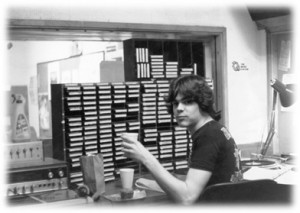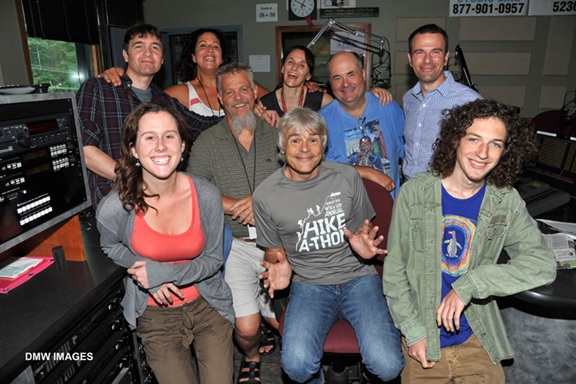Last week, another radio icon walked out of the studio for perhaps the last time. Bob Rivers is hanging up his headphones, but plugging in his amp – lots of them – to tour with Heart By Heart – at least for now. While some former radio stars go the podcasting or satellite radio route, Bob is leaving the daily radio routine to go on the road and perform on stage.
It’s not the first time. Way back in the day, Bob walked away from WFTQ in Worcester, MA, to join a band called Legend, only to return to WAAF where his radio career got underway in 1981. So maybe Bob’s departure from Seattle radio last week is déjà vu all over again.
 The picture at left is from those days, and shows the same spirited performer that audiences in the Boston, Baltimore, and Seattle areas came to know and love – in addition to the millions of fans of Bob’s Twisted Tunes franchise. Note that he’s holding a cup of coffee.
The picture at left is from those days, and shows the same spirited performer that audiences in the Boston, Baltimore, and Seattle areas came to know and love – in addition to the millions of fans of Bob’s Twisted Tunes franchise. Note that he’s holding a cup of coffee.
I was fortunate enough to work with Bob at KISW after Nationwide sold the station to Entercom. After years in Seattle radio, Bob and his team were truly hitting their stride at that time. If you know Bob Rivers, you know there’s a genuine quality to his art that has been there long before words like “authenticity” became overused in describing idea radio personality qualities.
During a crazy week as Bob wrapped up this phase of his radio career, he was kind enough to spend a generous amount of time answering a few questions. What started out as a few questions with Bob Rivers turned out to be an “exit interview,” and a chance for me – and now you – to tune into one of radio’s best entertainers. For those on the management side and those in the air studio, Bob’s words and thoughts are a primer for the ups and downs of enjoying an amazing radio career.
Bob’s “content” is so strong that we’re dividing our posts into two parts. Today, it’s about Bob’s career path and his team.
FJ: For all intents and purposes, you’ve only worked in three markets. Aside from not paying U-Haul and Atlas Van Lines, how has that been advantageous to your career?
BR: I view it like this. We are in the relationship business, and each gig is like going on a date. In the first nine years of radio I was career promiscuous, on lots of radio stations (one of them was literally a one-night stand!) I was making mistakes, hopping from transmitter to transmitter, figuring out who I was and what did and didn’t work. I’m sure lots of embarrassing things happened and I’m really glad there was no Facebook record of it all.
These relationships were all building towards the dream show. The one that becomes your family.
At WAAF, I ran into brilliant leadership. Working with owners and programmers who were on the cutting edge of team building and marketing. If you have a chance to work next to people who are way smarter than you, that’s a great gift. Led by Dick Ferguson and Steve Marx, programmed by people like David Bernstein, Rob Barnett and Steve Stockman. That station was a monster. So many brilliant radio talents were born there. I was taught to find something you can do better than anybody else and focus on that. That’s when Twisted Tunes were born.
There was a sign hanging on the Sales Department wall: “If it is to be, it is up to me!” That made people excited to do the work and strive for excellence. I wrote scripts and produced comedy bits and made song parodies. I bought a VCR so I could tape Johnny Carson and study his cadence and style of hosting. Consultants gave me tapes of Howard Stern. I didn’t want to be a shock jock, but I got that he was much more than that. His sharing of intimate thoughts with an audience bonded them to him. The Bob and Zip show was really my first serious relationship. Six years is a long time. But I wanted to live the WKRP dream in a bigger city than Worcester.
98 Rock in Baltimore is where I went to be a shooting star. Here I was, in a major market, full of vim and vinegar. Working hard, but also partying hard. All of my focused energy went into the show, and it went well. But I had lost that magical chemistry I had with my friend Zip (I was the driver; he had the big heart and smile and ready laugh that endeared us both to the listeners). Lesson to be learned. Chemistry is lightning in a bottle. It is magic, and if you know how to find it and keep it, you will be happy and successful.
In just two years, I was making it in a major market with a highly-rated show, incredible promotion, surrounded by really good people. Baltimore is one of the most charming, friendly, family oriented cities in America. The hills in northern Maryland where I lived were gorgeous. My PD and GM (Russ Mottla and Chuck DuCoty) were smart and supportive. The Baltimore Orioles Marathon was the NAB promotion of the year.
And yet I blew it. Did you ever break up with someone and say, “It’s not you, it’s me”? Well, Baltimore. It’s not you. It was me. I needed rehab.
I came to Seattle. If there are any of you radio types out there who’ve ever had a drinking, wake and bake, or nose candy detour… you know that sooner or later you have to deal with it in all your relationships. I was very lucky to be working for Nationwide, an insurance company-owned radio group that saw my situation as an opportunity. It’s an illness, and if he gets better, we will be the beneficiary. Again I got to work with radio legends. Led by Beau Phillips and Steve Young. I was also fortunate that my wife, Lisa, gave me a chance to grow and become a better person.
Newly sober, I decided to marry this city of Seattle for good. My cast of characters was all interesting, talented people I randomly met who had never done radio. And it was all about the chemistry.
Spike was a car salesman and singing bartender I came across in Baltimore who also did voice impressions. He has a genius comic mind. He could rant, rave, get angry, be sad, do it all unscripted, and be both full of shit and genuine at the same time. Genius.
Joe was a Southern transplant to the Pacific Northwest selling espresso drinks. At the time this was sold at local coffee shops all over Seattle. One of them had just a few locations – STARBUCKS, I think it was called. The espresso shop where Joe worked was an “herb friendly” establishment. Even though I was a no-imbiber now, I wanted a radio family of diverse people and opinions. Joe was not standard radio fare. Slow talking, dry wit. Full of wisdom, and not afraid to share his heart and vulnerability. He had that lovable chemistry I hadn’t felt since WAAF. Pure gold.
Rear left to right: Pedro Bartes, Jodi Brothers, Spike O’Neill, Luciana Bartes, Joe Bryant, Arik Korman.
Front: Interns Madeline and Joshua with Bob in the middle.
Our news gals over the years were not the giggling sidekick variety. All were successful broadcasters. We all loved, laughed, fought, agreed and disagreed, and almost always managed to do it in the spirit of fun. Maura Gallucci, from news leader KIRO, Kaci Aitchison, who left us and became a Fox News Television Anchor, and eventually, Jodi Brothers… who is the strongest, funniest female personality I’ve met and who will no doubt now be hosting another morning show.
Our morning show family from time to time needed counseling, and we weren’t afraid to ask for help. Our meetings and annual show retreats boiled down to a reminder that we needed to support each other, be clever, and always playful.
There are three other families involved here, too.
The Listener Family. When you marry a market for 25 years, you are a significant part of your audiences’ life experience. We just had an intern who’s a 4.0 honor student at Yale. He’s been listening since he was 8 years-old. A listener with ALS who wrote a book about Lou Gehrig’s disease wanted to meet me and thank us for the show before they unplugged his life support. Governor Jay Inslee calling one of our final shows to reminisce about the day we signed on in 1989. Husbands, wives, kids, all telling us what part of the show influenced and changed the course of their lives.
The Advertiser Family. We’ve been connecting our audience with great products for 25 years. I heard an inspirational speech delivered by Paul Harvey at an NAB Convention many years ago. He said radio should stop apologizing for running ads. We should instead be proud of every ad we run, and the great job we do bringing customer and client together. Wow. So who knew that after 25 years every one of our endorsement clients would want to keep me, Spike, and Joe as celebrity spokesmen? But that’s what’s happened.
Our Broadcaster family. When you work in one market for four different broadcast groups on three radio stations, with six program directors, seven market managers, and roughly nine corporate VP regionals (some of them were literally one-night stands), you know everybody and everybody knows you. Change is the only constant. Yet the more things change, the more they stay the same. In the end, we’re all a family, and it’s all about relationships.
Tomorrow, Bob talks about Twisted Tunes, his show’s community efforts, his family, and what’s next. He put a lot of time into responding to my questions, so please feel free to leave any comments you have.
From on-air stunts to creating a franchise like Twisted Tunes to life-changing charitable activities, Bob’s impact is a college-level course for fledgling air personalities.
- What To Do If Your Radio Station Goes Through A Midlife Crisis - April 25, 2025
- A 2020 Lesson?It Could All Be Gone In A Flash - April 24, 2025
- How AI Can Give Radio Personalities More…PERSONALITY - April 23, 2025





Amazing article, Fred. Thank you so much.
Thanks, Greg. Much appreciated.
Another thanks!
Great to hear from you, Miles, and thanks.
Fred, thanks for posting this. Having had the chance to work w/ Bob over his last year, I can tell my JacoBlog friends that he and his team are the real deal, top to bottom.
Keith, many thanks to you for reconnecting me and Bob. It was an honor to so this.